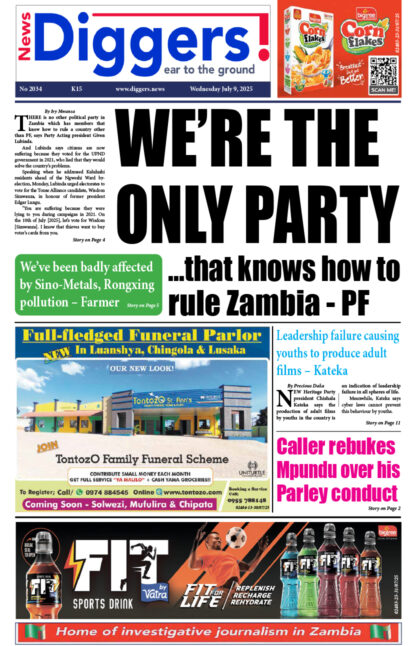UPND chairman for Economy and Finance Situmbeko Musokotwane says Zambia will lose many businesses due to reduced availability of money in the country due to debt servicing.
And Musokotwane says it is regrettable that President Edgar Lungu ignored his constitutional requirement of updating the nation on the status of national debt in his parliamentary address.
Meanwhile, Msokotwane has warned that national foreign exchange reserves will continue to decline if the debt crisis is not seriously addressed.
In a statement, Wednesday, Musokotwane, who is a former minister of finance, warned that an unprecedented number of businesses would close down.
“I have written about the negative effects of the debt crisis in the past. Here is a summary of the points. Firstly, a higher than usual number of businesses in Zambia will be closing for lack of customers. This includes both big and small businesses. This is caused by reduced availability of money in the country since large quantities of it will be externalized to go and service debt outside Zambia. In short, there is little money in the country. Secondly, some critical government expenditure will decline for lack of funding. Completion of on-going infrastructural works will suffer the same fate. Thirdly, the national foreign exchange reserves will continue to decline. In 2013 the reserves were in excess of US$3 billion. Today, the Bank of Zambia has only about half of that amount in reserves. With the reduced levels of reserves, our Kwacha is at very high risk of losing value against the US dollar and other currencies anytime,” Musokotwane stated.
Musokotwane stated that Zambia was on the edge and if authorities did not take swift and good decisions, the country might drift towards the unstable conditions of the 1980s.
“I will now elaborate on some of the negative effects of debt mentioned above because they can be very serious and extremely harmful to our country. Zambia is on the edge and if the authorities don’t take swift and good decisions, the country may drift towards the unstable conditions of the 1980s and 1990s when high inflation and severe loss of value of our Kwacha reigned. Zambians have already been stressed by rising prices, deteriorating business climate, stagnant incomes and yet facing numerous new and increasing levy payments to the government. Delaying salaries might therefore lead to labor discontent which the government is unlikely to want to see as we approach the election year 2021. The chances are therefore high that the government could start defaulting on some loans and obligations so as to meet local needs,” he stated.
“I will start with reduced funding for government expenditures mentioned above. In actual fact the country has been experiencing this problem for some time already. All over the country, many infrastructural projects such as roads, classroom blocks, district offices have stalled for lack of funding. Even the Kazungula Bridge project, a joint venture between the governments of Botswana and Zambia is threatened with closure because Zambia is reportedly failing to deliver her contribution to the financial package. In many schools, children are sitting on floors because there are no desks and, in many cases, even chalk for black boards writing is not available. These services are failing because government is diverting money to debt servicing.”
Musokotwane observed that consistent salary delays by government were causing stress among public employees.
“It has become clear in the past few months that an important category of government expenditure namely, public wages and salaries, is joining the list of expenditure items that the Treasury is failing to honor on time. At the end of February, several government ministries and institutions failed to pay salaries within that month because the Treasury failed to fund them on time. Up to the middle of March 2019, the public universities had not yet paid salaries because the budgeted support from the Treasury failed to materialize. As for local council employees throughout the country, most of them have resigned themselves to the situation in which at any given time they are owed one or two months in salary arrears. This dire situation of consistent salary delays is something that is new in Zambia and it is causing lots of stress among public employees,” he stated.
“Unfortunately, the phenomena of salary and wage arrears to public workers may stay with us for the rest of 2019 and even beyond. The reason is that the government has vowed that it shall not default on paying its debt obligations. The government is afraid that if it defaults on even one loan, then all other lenders will demand that they be paid at once even if their specific loan is not yet due for repayment. This is a normal practice for lenders when facing a borrower who is defaulting on third party loans.”
And Musokotwane noted that the 2019 projected revenue base and grants was not enough to meet the key expenditure items in the budget.
“Here is the difficulty that the government faces: The revenue and grants it projected to receive in 2019 is not enough to meet the key expenditure items in the budget namely the cost of running government, paying all salary and wages for public workers on time and still be able to service all the public debt. The cause of all this is the sudden rise in money required for debt servicing. Way back in 2011, debt servicing was a tiny amount in the budget. Now, it is the biggest expenditure item and it is larger than the money allocated for Education which has normally been the biggest item in the budget,” he stated.
Meanwhile Musokotwane stated that by making debt service payments the number one priority, the release of funds for salary and wages would often be delayed in 2019 and beyond.
“The 2019 budget claims that it is fully funded and therefore can meet all these expenditures on time. Unfortunately, some of the revenues projected in the budget were only true on paper. In reality such revenues are unrealizable. A good example of this is the envisaged increased taxes from the mines. Similarly, some of the expected loans not tied to any project but meant for general use in the budget (so-called program loans) look far-fetched. The typical lenders under this category (like IMF, World Bank, African Development Bank, etc.) are unlikely to disburse such money in the absence of a credible plan on how Zambia intends to deal with its debt crisis,” Musokotwane stated.
He stated that government had no capacity to resolve the country’s economic challenges.
“In short, Zambia does not have enough money to meet the important expenditure categories of running government, development projects, debt servicing and public salaries. In the past few years, the government handled the problem of cash shortage by suspending some development projects and scaling back on important social services as mentioned above already. Since that has not been enough to resolve the problem, the cash conserving measures have now been extended to delaying salaries. Meanwhile, debt serving, which is the main cause of all these problems, has been spared as the government remained current on this expenditure item. By making debt service payments the number one priority, the release of funds for salary and wages will often be delayed. This is why salary arrears have emerged. Once salaries arrears start, it is not easy to dismantle them within months because they are huge,” stated Musokotwane.
He also expressed fear that government may start printing money in order to artificially meet its financial obligations.


















